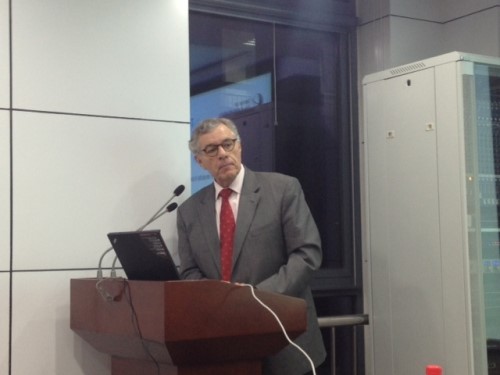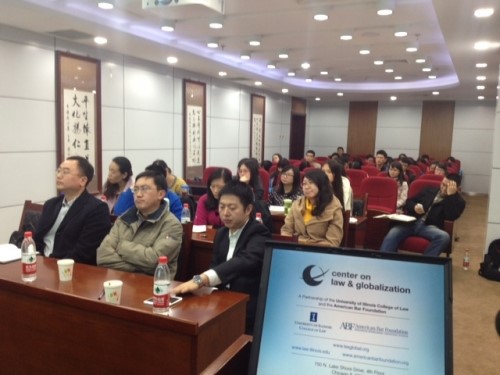
Professor Terence Halliday

The lecture on “Research Methodologies: Criminal Practice and Criminal Procedure in China”
6:30 p.m on October 29th, a lecture named “Research Methodologies: Criminal
Practice and Criminal Procedurein China” was held in Xueyuan Road campus. The venue was B211 in Research Building of Xueyuan Road campus. This lecture was the
third lecture of “ the fall forum of evidence law and forensic science “ in this term.
The speaker was Professor Terence Halliday who is a professor of American Bar Foundation, director of the Center for Law and Globalization Research and former
chairman of The Law and Society Association. Associate professor of Evidence Science Research Institute Hongqi Wu presided over the lecture, Dr. Zhuhao Wang
worked as a translator.
The lecture was held in a relaxed and pleasant atmosphere. Professor Hongqi Wu introduced Professor Halliday briefly. Professor Halliday once taught in University of Toronto, University of Chicago. His research interests are sociology of law, law and globalization. Recent years ,he focuses on research methodologies of criminal practice
and criminal procedure in China.
In this lecture ,Professor Halliday talked about the legal change and the research methodologies of legal change in five aspects. Firstly, Professor Halliday introduced the theory of legal change. He pointed out three empirical evidences of legal change in China. He talked about the change of 1996CPL(Criminal procedure Law) and the
National People's Congress and lawyers played a important role in legal change. Professor Halliday introduced the research methods including interviews, archives, public documents, survey and how the methods were used to research the criminal procedure change in China. In the second part, Professor Halliday talked about the lawyers’ believes and standpoints about legal change. He said they accumulated data about lawyers through interviews and ACLA forum. He mentioned issues of interviews. In the third part, Professor Halliday gave an account of criminal practices. He elaborated the “Big Stick 306” of criminal law. He claimed that the use of Article 306 against Zhuang Li had an intimidating effect on legal practice far from Chongqing. In the fourth part, Professor Halliday introduced the media’s influence on criminal law. They get data from analyzing ten thousand media reports.
Vice-president Zhong Zhang spoke highly of Professor Halliday. He had comments to the lecture combining with his experience on empirical study of China’s criminal procedure law. In the part of Question and Answers, some teachers and students raised questions on the lecture. Professor Halliday made detailed answers patiently to these questions.
Finally, Hongqi Wu summarized the lecture and said welcome and thank you once again to Professor Halliday, the reviewers and the translators. Lecture had a harmonious ending.